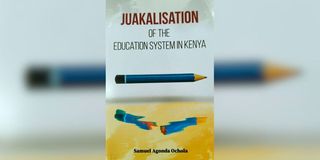
The cover page of Samuel Agonda Ochola's book Juakalisation of the Education System in Kenya
Almost every Kenyan has an opinion on the state of the education sector today. The common theme in public or private conversations on education in Kenya is that there is something wrong with the school system. Parents complain about school fees. Pupils complain about a ‘heavy syllabus.’
Teachers complain about poor working conditions, poorly prepared students, demanding parents, poor pay and high expectations from parents, school administrators and the ministry of education.
The government alleges that parents and teachers are not as committed to the education system as they should be. Therefore, it appears that everyone who has something to say about the education system thinks of it negatively.
Why? First, because it is normal for people to cast aspersions on a subject such as education, which involves almost everyone in society should they not feel satisfied about it. Consider this. Politicians promise citizens that they will guarantee free or affordable education when they get elected.
Yet, after being elected they vote to introduce or increase school fees. Naturally, parents would be offended. Teachers worry a lot about their salaries and welfare. There has hardly been a year in the past decade when teachers did not issue a strike notice and eventually down their tools, to the detriment of learners. The government, which is the main employer of teachers in Kenya, is always demanding good performance - as reflected in students’ grades - from the teachers.
Second, there is a public outcry that the skills and knowledge that Kenyan learners acquire in school is inconsistent with the workplace demands of today. This claim is made without any sense of irony; as if the education sector has endless resources that it would use every year to improve the knowledge and skills in schools and colleges. Yet, knowledge and skills are innovated. There cannot be new knowledge without research and development of the ideas that research has identified as potentially exploitable.
These are some of the issues that prompted Samuel Agonda Ochola to write a book that he calls Juakalisation of the Education System in Kenya (InterCEN Books, 2022). Jua kali (hot sun) is the metaphor for hustling in Kenya. It is a way of talking about millions of Kenyans who do not work in an industry, in the traditional setting of an enclosed factory with warehouses, or those who do not work in some office. Jua kali is what hawkers, street vendors, farmhands, itinerant traders etc deal with every day - the hot, sometimes unforgiving, tropical sun. It is about poor wages. Tough and sometimes rough working conditions. An unpredictable market. If one were to see it in the sense of rudimentary production of goods by way of metalwork or woodwork or tailoring, for instance, then one could rightly assume that these are the incipient stages of industrial production.
But Juakali in Kenya has little to no chance of ever transforming into some kind of industrial production. At best, Juakali remains an artisan’s or craftsman’s world. The artisans find it difficult to innovate further, invest in better workshops and machinery to produce goods on an industrial scale. The government does not seem to have the capacity to invest - or provide conditions and loans - in the sector, even as small and medium enterprises, despite the proclamations by state officials.
How can the education sector be juakalised, in a manner of speaking? What does Ochola mean by juakalisation of the education system…? This is how he defines the problem: “…the commoditisation or commercialisation of education in Kenya has now reduced the institutions of higher learning to a level that is synonymous with the juakalisation of the education system in the country. Juakalisation, …translate into substandard, below par, and therefore not of higher quality. It also implies being so panel beaten that nobody no longer knows its shape, structure or form. It is amorphous, with no identity at all and lacks direction.
For Ochola, the problem with the education system in Kenya is historical. He traces the system of education to the precolonial time when parents and elders played a key role in the education of the young. Children learned from their parents, older siblings and elders. Lessons drew from the environment and the people’s culture, religion, agriculture, their total ways of life. But colonialism disarranged such structures when it introduced formal education, which, though, was meant to produce ‘educated’ Africans to serve the interests of their colonial masters. Even when such Africans served their own people, they were alienated from their cultures, sometimes seeing themselves as ‘civilized’ compared to their supposed ‘backward’ relatives.
Ochola traces the history of education in Kenya through the many commissions, from the Phelps/Stokes of 1924 to the most recent recommendations that introduced the Competency-Based Curriculum (CBC). He shows how throughout history, the various commissions have recommended policies and systems of education that still leave a majority of Kenyans out of the mainstream. For instance, whatever reforms happened in the education sector, the poor, especially those in the rural areas and the slums remained on the margins of the system. If they could not afford the basics of life, how could they afford to pay for education?
Undoubtedly, post-colonial Kenyan governments have never been able to actually offer education for all Kenyans who desire to study, whether by paying fees for all learners or making education affordable for all Kenyans. The cost of education, even when the government pays teachers and funds infrastructure, is inflated through several - often hidden - expenses such as school uniform, tuition fee, activity fee, building fee, teacher motivation fee, tour fee etc. The quality of classrooms, laboratories, equipment etc widely differs, for instance, between a national school, extra-county school. Reports continue to widely circulate in the media about many primary schools where the Junior Secondary School, which includes Grades 7, 8 and 9, is based lacking adequate classrooms, laboratories, workshops but most importantly, teachers.
As Ochola suggests in Juakalisation of the Education System in Kenya, it is not just the lack of these resources that afflicts education, the quality of the teachers, from preschool all the way to the university is even more troubling. What about teachers who emphasize rote learning, sell examination papers to the highest bidders, or even sit the examination for paying candidates from rich families, to university lecturers who exchange marks for sex? What these kinds of teachers do is to demotivate all learners - the clever pupils know in advance that it is just a game of chance but not a creative system that rewards industry; the weak students know that they can buy the grades because the school system is just a marketplace.
But it is the miseducation of Kenyans, right from preschool to the university that Ochola sees as the root of what he calls juakalisation. What exactly is the philosophy behind Kenya’s education system, the author appears to ask? Did post-colonial Kenya really move away from the colonial system? What kind of subject does the system intend to graduate at the end of the school system - a scorer of high grades but immoral character, lacking in creativity or a civic subject who understands their society and people and is a critical thinker?
Samuel Ochola ends his argument in Juakalisation of the Education System in Kenya by emphatically repeating a conclusion and proposal that has been made before in these words: It is my considered contention that the reform that should be undertaken will have to go beyond mere technical issues and look at how to de-enslave the African mind that has been systematically indoctrinated, through an alienation education, to hate what is truly African. Unfortunately, the so-called highly educated Africans do not want to hear anything said against indoctrinating education that is so lucrative to them. These educated elite would and do defend this miseducation with their very lives! This is a tough call, but Kenyans should heed it if they hope to improve their education system. This is a book that every Kenyan who works in the education sector or is interested in education should have.
The writer teaches literature at the University of Nairobi. [email protected]









